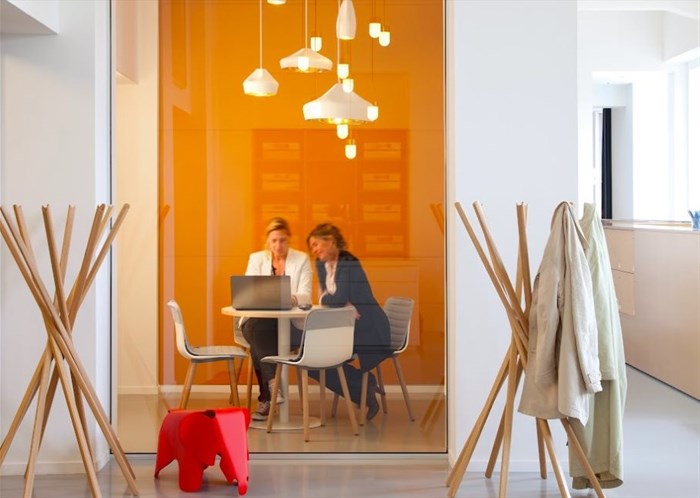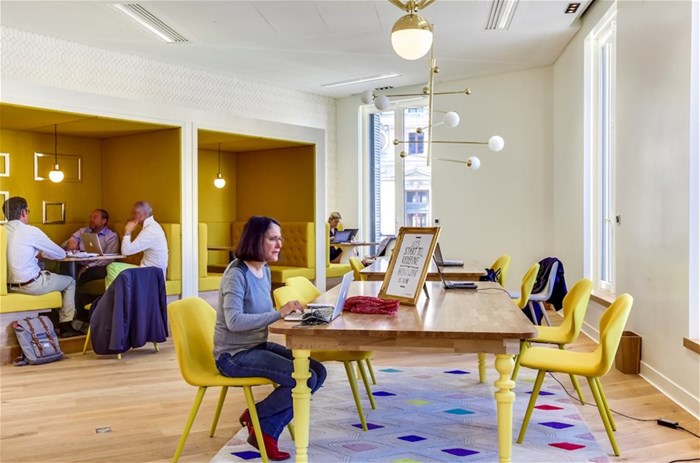Climate change is one of humanity's greatest issues, and urgent action is required to avoid crossing irreversible environmental tipping points. Offices, responsible for 41% of the world’s energy use, offer a clear opportunity.
By cutting emissions, property owners, landlords, and commercial real estate investors can not only help tackle climate catastrophe, but also secure a more profitable future.
The urgent global mission to halve CO2 emissions by 2030 and reach Net Zero by 2050 means drastic action is needed across all areas of business – and commercial real estate is one sector that has the potential to make transformative changes.
Office buildings in particular present a great opportunity for improvement. According to the US Green Building Council, they account for 41% of the world’s average energy use. By increasing energy efficiency, property owners can drastically reduce their buildings' carbon footprint and play a key role in combating the climate crisis.
The benefits of taking action extend beyond just reducing emissions. Adopting greener building strategies is crucial for future-proofing your assets. In an era of tightening environmental regulations, property owners who don't adapt risk their buildings becoming obsolete. It also enhances your building's reputation and value. This can attract environmentally-conscious businesses, potentially increasing your occupancy rates.
Indeed, research by estate agents Knight Frank reveals that green offices in London command a 12% rental premium and a 10 to 11% sales premium. These premiums are expected to become the norm across all property markets. Therefore, adopting sustainable practices doesn't just contribute to saving the planet, it can also improve your property's appeal and financial returns. It's a win-win for all stakeholders in the commercial real estate sector.
Building a greener portfolio
So, as a building owner, landlord or property investor, what can you do to make your portfolio greener? Here are five suggestions.
- Switch to renewable power
There are a number of ways of achieving a switch to renewable power. It could involve installing renewable generators on site, such as solar panels and wind turbines. Alternatively, you could purchase green power from off-site energy providers. Take inspiration from the Regus One Welches office in Barbados, referenced in our white paper, which generates enough electricity to power a Nissan Leaf for more than two million kilometres of travel a year and also has the island’s largest solar carport and electric vehicle charging infrastructure.
- Plan for energy-efficient design and construction
Energy efficiency should be a fundamental consideration of the design of any building. Complying with green building standards, such as LEED or BREEAM, can help optimise energy use, while measures such as incorporating energy-efficient materials and insulation into the build and installing energy-efficient HVAC, lighting and building management systems will help reduce energy consumption once tenants move in.
Plan for the use of recycled materials in the construction phase, too. Spaces Tullinløkka in Oslo shows what’s possible: it’s built from 80% recycled materials, and the use of reclaimed tiles alone saved 34,000kg of CO2 in the construction project.
- Provide sustainable transportation options
Returning to something we touched on in the Barbados example earlier, another way to improve the eco-credentials of your building is to provide facilities that give greater sustainable transport options. That could mean installing infrastructure for electric vehicle charging stations, which IWG is installing across its flexspaces as part of a global initiative. You could also provide bike storage, showers and changing facilities to promote other greener transport options.
- Conserve water
Saving water is another important part of any sustainability strategy. Measures might include water-efficient plumbing fixtures, irrigation systems, rainwater harvesting and ‘greywater’ recycling systems. At the Signature Star Metals flexspace in Atlanta, USA, a special drainage system can capture and store more than 56,000 gallons of rainwater. Spaces’ Tour & Taxis building in Brussels is energy neutral, thanks in part to the gardens that help to regulate the internal temperature, and these are watered using collected rainwater.
- Convert offices into flexible workspaces
Hybrid work has become the norm, with companies embracing flexibility and distributed workforces. As a result, companies are increasingly terminating leases on traditional office buildings and instead investing in a network of flexible workspaces to enable their employees to work wherever they need to be.
For property owners, this presents an opportunity to adapt and thrive. By transforming traditional offices into state-of-the-art, environmentally efficient shared workspaces, they can achieve higher occupancy rates and effectively lower emissions per employee.
But the benefits of flexible workspaces extend beyond building walls. With more local workspace options, employees can work closer to home, cutting commuting times and related transport emissions. In fact, IWG’s latest research with Arup indicates that hybrid work models, considering both reduced building and transport emissions, can decrease urban carbon emissions by up to 70% in the UK and 87% in the US.
Choosing to partner with IWG offers a pathway to capitalise on this shift towards hybrid and sustainable workplaces. With access to millions of customers who rely on our products and services every day, you can tap into a network that aligns with the evolving needs of businesses and promotes efficient use of resources.

Increase sustainability, increase revenue
As the need for sustainability grows ever more pressing, building owners, landlords and investors can seize this opportunity to meet the evolving needs of businesses. Not only does this help them contribute to a greener future, but there’s a material advantage: increased sustainability comes with increased revenue as demand for green buildings grows.
Partnering with IWG allows you to elevate your properties, enhance their appeal to environmentally-conscious tenants, and secure a competitive advantage in the increasingly green marketplace.
About IWG PLC
IWG is the global leader in hybrid work solutions and workspace brands. We create personal, financial, and strategic value for businesses of every size. From some of the most exciting companies and well-known organisations on the planet, to individuals and the next generation of industry leaders. All of them harness the power of IWG’s hybrid working platform to increase their productivity, efficiency, agility, and market proximity. IWG’s unrivalled network coverage includes approximately 4,000 locations across more than 120 countries and 83% of Fortune 500 companies are amongst our growing customer base.
Through our brands including Regus, Spaces, HQ and Signature, we help millions of people and their businesses to work more productively. We do so by providing the world’s leading hybrid work platform with professional, inspiring and collaborative workspaces and digital services all available via the IWG app.
For more information visit www.iwgplc.com and for more information on partnering with IWG, see https://www.iwgplc.com/develop-a-location.
































